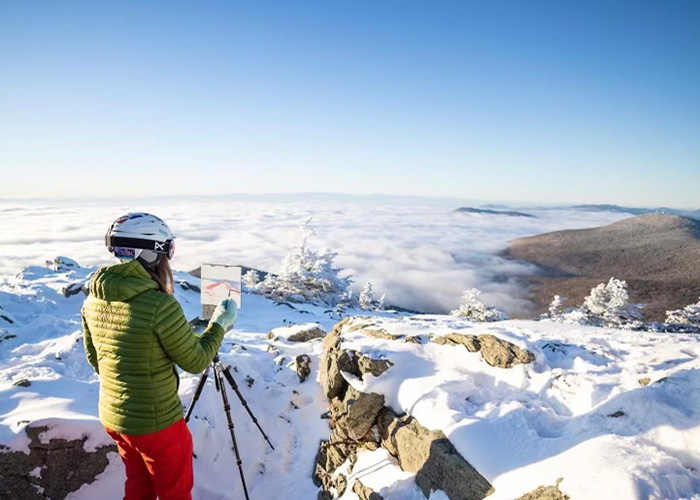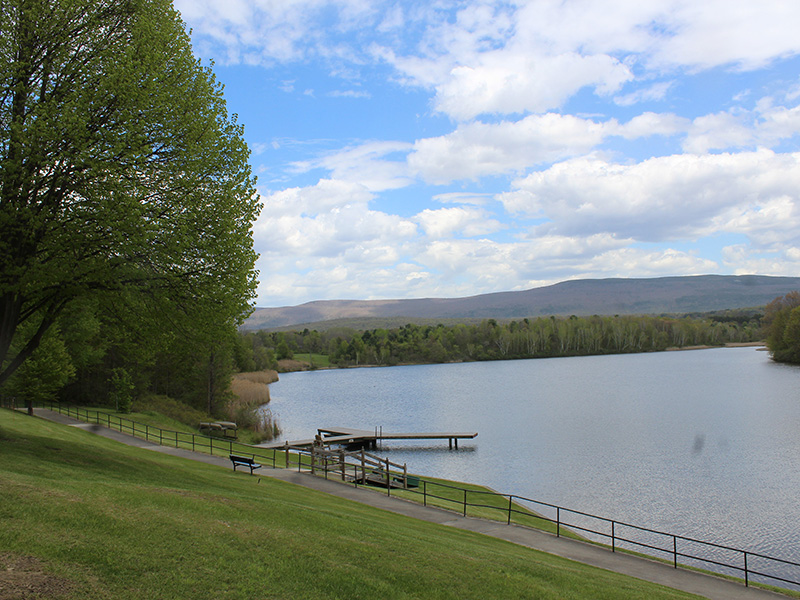Vermont’s outdoor guides help visitors take their first steps into new outdoor activities, show them some of the state’s most beautiful places, and provide a welcoming, safe environment for exploration.
Following in and establishing an outdoor guide business requires a strong foundation of outdoor experience, bolstered with professional licensure and relationships with other outdoor recreation businesses, says Graydon Stevens, executive director of Vermont Outdoor Guide Association.
Success as a guide starts with a genuine love for the outdoors, says Travis Dezotell, who owns Island Pond-based Gibbs Guides.
“There’s no replacement for the experience side of it.” Guides spend as much effort managing the excursion, including ensuring safe use of gear and making quick decisions based on the weather, as they do entertaining their clients.
“You have to constantly be on the lookout. You can’t fake it,” Dezotell said.
Capt. Matthew Trombley, owner of 3rd Alarm Charters, a fishing guiding service based in Rutland County and serving the Killington and Okemo areas, grew up spending almost all his time outdoors and agrees – experience and passion for the outdoors is a must, because it makes inspiring others easy.
Trombley pursued professional licensure and is now a Masters Captain. His company owns and operates three boats, and he is president of the board of Vermont Outdoor Guide Association.
Career paths centered around recreation provide solid footing for a guiding business, Stevens says.
Dezotell started his outdoor guide career as director of a parks and recreation department in Vermont. In his spare time, he wrote and published a guidebook about hiking and snowshoeing, and things took off from there.
“All of a sudden, I started getting more phone calls from people asking to go on hikes and other experiences like that. More than I was selling books, people really wanted to go on hikes.” Quimby Country, an outdoor retreat in the Northeast Kingdom, saw Dezotell’s blog posts and hired him to be the outdoor recreation specialist.
“My business springboarded off of that start in the industry,” he said.
Dezotell still works with clients at Quimby Country, an outdoor retreat in Vermont’s Northeast Kingdom, but has since gone on to own and manage Gibbs Guides full-time.
He says besides building a solid base of outdoor experience, creativity and a willingness to go off the beaten path – both literally and metaphorically as guides establish their businesses – are key.
Vermont’s business landscape, he says, provides opportunities for people to make a living if they’re willing to work hard and look for unexpected opportunities.
Social media can be a cost-effective way to scale an outdoor guide business. Blogging, sharing outdoor tips, and posting high-quality images inspires people and helps build a client base.
Stevens says Vermont’s geographic diversity means there’s many different opportunities for guides to find footholds in the state’s business community.
Vermont’s guides offer such diverse experiences as fishing, snowshoeing, hiking, camping, canoeing, ice climbing, SCUBA diving, sky diving, and dog sledding.
“Guide services operate year-round, matching our four seasons,” said Stevens.
Spring in Vermont makes for excellent fishing, road bike touring, and nature tours. In early summer, hiking, rock climbing, mountain biking, horseback riding and ATV tours are all great options into fall, when many people visit to take in Vermont’s colorful foliage. In winter, dog sledding, ice fishing, ice climbing, snowmobiling, snowshoeing, back country skiing, and more opportunities await.
Many guides partner with local lodging properties and outdoor equipment suppliers to provide a more in-depth experience for their clients and to help build their businesses, he said.
Stevens’ biggest tips for those looking to establish a guiding business in Vermont include looking for professional certifications and licensure, as well as getting a foot in the door in the industry.
“Get a job with a guide service or outfitter to start out,” he said. “Getting the appropriate certifications for your activity is important and will help you to land a job. Running a guide service involves much more than just being skilled in one or more activities. You will need to understand risk management, rules regarding commercial access to public and private lands and waterways, knowledge of State laws, customer service, marketing and more.”




